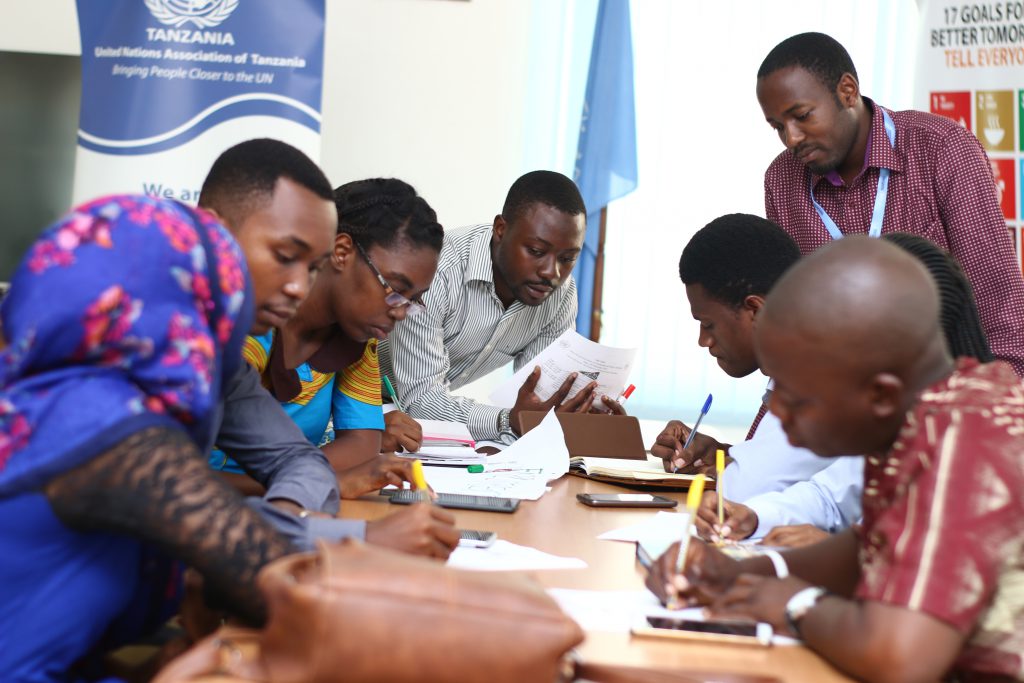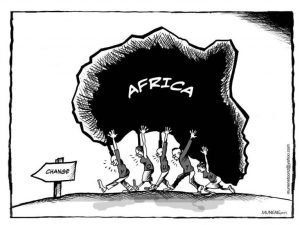Youth is one of the greatest assets that any nation can have. Not only are they legitimately regarded as the future leaders, they are potentially and actually the greatest investment for a country’s development. Young women and men are, in particular, recognized as a vital resource whose future prospects are inextricably tied to that of their country. For the first time in history, the number of people in the world aged 12 – 24 is the largest ever. According to the World Development Report 2007, there are 1.3 billion people in this age group. Close to 85 per‐cents of this over 1.3 billion young men and women live in developing countries; this figure is projected to increase to 89 percent by 2025.
Tanzania’s population is predominately young. Tanzania has a population of 49.08 million (2012 Census). One-third of her population is young people between the ages of 10 to 24 years. The recognition of this fact led to the development of the National Youth Policy and today leading to the subsequent reviews of the policy.
The National Youth Policy recognizes that the youth who constitute about 65 percent of the Labour force and 35% percent of total population is not represented in various forums and do not participate adequately in decision making bodies. For instance, according to the Inter-Parliamentary Union, only 0.6% are parliamentarians aged under 30 while as per the National Election Commission (2015)-NEC the number of voters between the age of 18 to 35 are 6,155,613 (27% for young men) and 6,738,964 (30% for young women). This shows that in spite of youth to be a key deciding vote for those seeking power but they are still lagging behind in terms of themselves being in the ballot box, as a result, most of the decisions which have been made do not take concerns of the youth. In addition, there is inadequate involvement of youth at national and international forums.
The policy takes into account the range of problems faced by the youth, anticipates the challenges that they are likely to confront and outlines appropriate objectives, policies, programmes and implementation plans which will be put in place so as to empower the youth to take charge of their own destiny as well as make them active participants in the shaping of the political and economic destiny of our nation. The policy also recognizes that youth are not a homogeneous category and that differences exist among them. Therefore, the policy contains provisions that address the specific and special needs of each of several identified target groups.
Policy Context
- The National Youth Policy recognizes the broader policy context in which it has been formulate\d and shall operate. This policy context is guided largely by other national policy initiatives and it is also reflective of international programmes and conventions. In particular the following:
- Constitution of the United Republic of Tanzania – The constitution sets abroad policy context for the National Youth Policy.
- The Tanzania Five Year Development Plan which was launched in June 2011.
- The Sustainable Development Goals (SDGs) – The National Youth Policy acknowledges and reaffirms the commitment of the United Nations Sustainable Development Goals to the advancement and well being of the Youth.
- The EAC Youth Policy – The National Youth Policy recognizes the EAC Youth Policy as the basis for the overall development of all young people in the sub‐ region.
- African Youth Charter – Tanzania, as a member a member state of the AU, which have ratified or acceded to the African Youth Charter is working towards achieving the principles of the Charter which enable all young men and women to enjoy full participation in the life of the society.
- Commonwealth Youth Charter – the National Policy recognizes the work of the Commonwealth in the support of national youth policies in all commonwealth countries and its effort towards creating societies where young women and men are empowered to develop their creativity.
- Charter of the United Nations – Tanzania, as a member of the United Nations agrees to the attainment of the purposes and principles of the Charter of the United Nations which enables young men and women to enjoy full participation in the life of society.
- United Nations World Programme of Action for Youth ‐ The principles and purposes of the United Nations World Programme of Action for the Youth has helped to inform the National Youth Policy at many level.
Definition of Youth
Youth, as a concept varies from culture to culture and from society to society. In most societies in Tanzania, the progression from childhood to youth involves some systematic rites of passage. These rites have symbolic significance in that, simply by participating in them, an individual achieves a new status and position.
Such new status gains validity through genuine community action and recognition. According to the National Youth Policy 2007, Youth in Tanzania shall be defined as young men and women from the age group of 15 years to 35 years.
Economic Situation as per the National Youth Development Policy of 2007
Youth economic activities depend on the geographical place, age, sex and natures resources available. In. general, Youth in Tanzania engage in the following economic activities:
- Production activities in the sectors of agriculture, fishing, mining, animal husbandry and small-scale industries especially in carpentry, tailoring, and black
- Petty business like selling second-hand clothes, fruits, and various foodstuffs. Despite the fact that these youths are self-employed in the above-mentioned sectors; they face a lot of problems in implementing their activi , Major problems are lack of capital, equipment, and technical know-how or skills.
- The transport sector, this activity is dominated by the growing number of young people who are dealing in Boda Boda business and local business transport
- A small number of youths (3.4%) are employed in the civil service, in parastatal organizations, and in the private sector. This group is but only a fraction of the total number of educated and trained youth in various disciplines. However, under the economic reform policy, many educated youths have been retrenched from work, many of these youths do not expect to be employed in the formal sector. The problem of unemployment affects both boys and girls. However, the latter has been most affected and as a result, many of them are engaged in nonprofessional and low income earning activities.
- The unemployment rate amongst young people aged 15 – 24 years in Tanzania is 13.4%. Unemployment is also higher amongst young women (14.3%) than amongst young men of the same age, 12.3% (MKUKUTA Poverty and Human Development Report, 2011).
The Political Situation as per the National Youth Development Policy of 2007
Under the multiparty system, youth participate in various political organizations and in decision-making. However, currently, there is no clearly defined system which prepares young men and women to take up leadership positions in the existing parties and government. Another challenge in political areas is for girls to emerge as leaders or representatives in decision making organs. According to the Constitution of the United Republic of Tanzania of 1977, as amended from time to time, any person who has the age of 18, male or female has the right to vote and to contest for leadership at certain levels. Effective and meaningful youth participation is required. According to the constitution, every youth who has reached the age of 18 have the right to vote and contest for leadership at certain levels. In nutshell, regardless of the constitution giving this right to youth but a number of those who contest at those certain levels is unsatisfactory.
Participation of youth in civil society (NGO policy 2001) is declining or linked closely to various political parties. While youth must be free to learn and subscribe to various political ideologies, they must also have the opportunity to engage in civil society initiatives independently of party politics. Most often young people are manipulated by political parties both in and out of power. State resources are sometimes used for mobilizing young people with political agendas. It is unfortunate that most youth movements in Tanzania are linked to political parties and political figures and that there are very few independent initiatives by young people. The lack of civil society participation among young people is reflected in their apathy and disinterest in matters of social importance
Policy Gaps
- The policy is gender insensitive – Only a few Youths emerge as leaders or representatives in decision-making organs however for the number of girls the situation is not good either.
- Limited resources to implement the policy-the National Youth Development Policy recognizes the need for local government to incorporate into their plans and implement youth development programs. However, the number of youth who are benefitting from the 4% youth fund at the district level is unclear and most of them are still unaware of the existence of such opportunity.
- Regardless of the constitution to give youth the right to vote and contest at certain levels of leadership but still most of them are required to be in political parties to use that right, even when they’re in those political parties most of them are not given space to contest due to financial reasons, constraints among others, this makes it very difficult .
- The policy assumes that Young people are too political, while most young people are not interested in politics, politics is not their cup of tea and usually, consider politics as a game for old people –(Not too young to run campaigns).
- For young women, it’s even difficult for them when they are interested in contesting for key decision making positions, a lot of negative attitude before they are involved.
- The 2007 Youth Policy has no room for innovation and inventions, A lot is happening into days sphere but they are not integrated into the policy as inclusions.
Policy Recommendations
- To ensure this policy is executed, an implementation strategy should be developed with clear targets that will be negotiated with the different stakeholders.
- Ensure there are Youth Representatives in the parliament coming from the national youth council and National Youth Bodies.
- Putting in place policy which mainstreams youth agendas, especially in participating in the democratic process of the country. For instance, reduction of nomination forms fee of a political party for the presidency and parliamentary seats.
- Establish community service for youth and promote volunteerism.
- Establish a reward system for recognizing outstanding community service among youth at the national level.
- Despite the fact that there has been an increase in the number of youth participating in decision-making bodies both at the central and local government authorities there is need for increased involvement of this social group in all levels of decision-making from the central government to the local governments is of necessity for national interests. Research shows that youth participation, especially in LGAs in Tanzania, is below 50 %.
Conclusion
The Youth Partnership Countrywide aims to have youth development programmes in place that respond to the challenges faced by the youth in Tanzania and enable young people to have agency and take charge of their future.
Informed by the youth policy 2007, experience and research on the state of young people, the following areas were prioritized:
economic participation; education, skills, and making the correct behavioral changes, and instilling a sense of solidarity and love of self and country in the youth.
To enhance economic participation, the Youth Partnership Countrywide suggested measures include industrial policy interventions to improve labour absorption in the economy; work exposure measures to provide young people with opportunities to gain on-the-job experience; linking young jobseekers to employers; interventions to support entrepreneurship; facilitating access to opportunities, business training, and markets for youth-owned companies and cooperatives; and improved public employment schemes.
The suggested interventions for improving access and quality of education and skills development include improving the quality of basic education through teacher training and introducing after-school care programmes, strengthening the curriculum and gradually introducing free basic education for poor learners until undergraduate level. Special attention should be given to providing unskilled and uneducated youth with second-chance opportunities.
Suggested health interventions include encouraging behavioral changes so that young people develop a good self-image, developing the skills needed to be assertive in making decisions about sexual and reproductive health and using laws, policies and recreational facilities to deal with the challenge of substance abuse and related illnesses, particularly among the youth.
Youth Partnership Countrywide calls for the fostering of leadership, active citizenry and the living of values outlined in the Constitution to address social cohesion and active citizenry, fast-track the implementation and establishment of the national youth council ,getting youth representation in the Tanzanian parliament and the cabinet ,carrying out awareness campaigns to enable youth to participate in election process at all levels from the grassroots to top level as well as advocating for the constitutional change to enable youth at 35 years to run for presidency .
To ensure this policy is executed, an implementation strategy should be developed with clear targets that will be negotiated with the different stakeholders. An implementation evaluation should be conducted two years after the strategy is promulgated. It should be followed by an impact evaluation before the preparation for its review. The implementation evaluation will show whether the policy is being implemented as planned and where improvements are needed. To ensure a good evaluation, the study is conducted in after every 3 years, Monitoring, and Evaluation to ensure data requirements are mapped and their collection is set immediately after the gazetting of this policy.
Current situation states that more than 65% of the working age (15-64), which is 50% of the population are between 15 and 35. More than 85% are unemployed. The dependency ratio in the young population is 87.02% while the current Youth policy states that 17.9% Million of people who are 65% are aged 15-35 of which the number has increased.
Co-Written by:
Seleman Yusuph Kitenge
Candidate of Msc (Humanitarian Actions, Cooperation, and Development),
PGD – Management of Foreign Relations, BA in Sociology (Hons),
Youth Development Expert, One Young World Peace Ambassador
Director of Media & Communication, AfriNYPE.
seleman.kitenge@afrinype.dedicatedlinks.xyz, Twitter: @selemankitenge
Badru Juma Rajabu
BA in Public Administration
Youth Development Expert, Tanzania’s Youth Envoy to Commonwealth,
Secretary General of Youth of United Nations Association of Tanzania,
badrujumah@gmail.com, Twitter: @badrujumah





